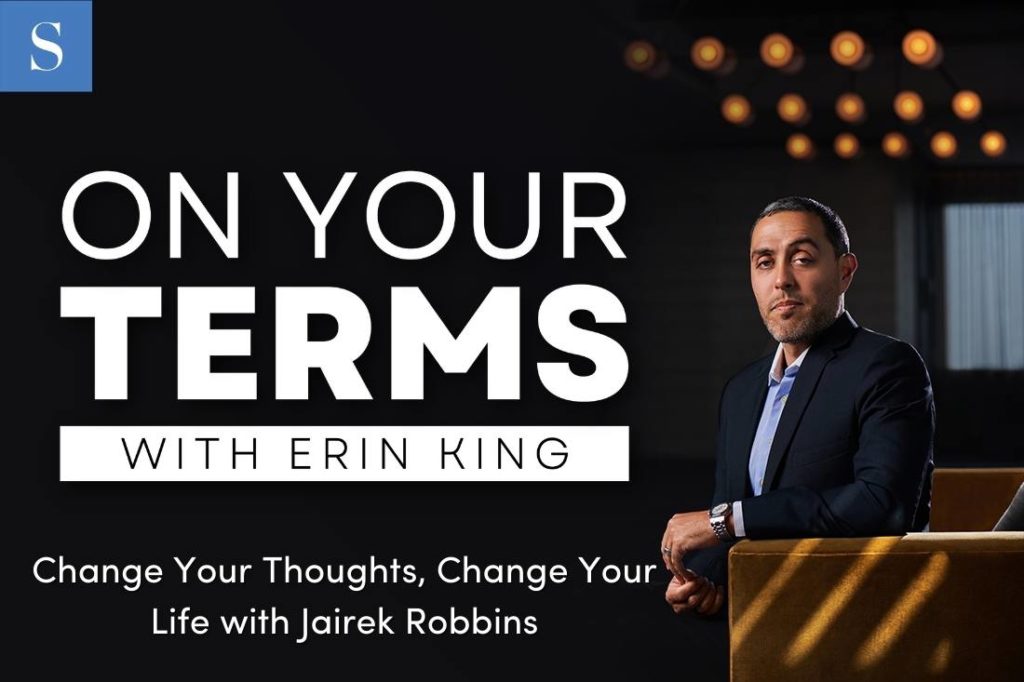Describe your perfect day. Where would you wake up? Where would you be? How would you feel? What would you do? Who would be with you?
When was the first time someone asked you those questions? According to best-selling author and business and performance coach Jairek Robbins, most people say they were “today years old” the first time they heard the question.
But for Robbins, that was far from the case. He first had to answer those questions for himself when he was 8 years old. Maybe that’s a product of who his parents are: His father is famed author, coach and motivational speaker Tony Robbins, and his mother was a coach who taught people how to overcome limiting beliefs about themselves by breaking bricks with their hands.
Answering the question about the life he wanted gave the younger Robbins the tools to make his vision a reality. It all starts with a change in your thoughts.
Robbins joined Erin King for the latest episode of On Your Terms to discuss his story, what drives him and how you can change your own life with your thoughts. Read on for more from their conversation.
On Your Terms with Erin King is no longer releasing new episodes on the SUCCESS Podcast Network, but you can still listen to the full conversation below.

Two mountains to climb
Over the course of his career, Robbins has helped countless people achieve their goals—often despite significant traumas or limitations they might have experienced.
How does he do it? A lot goes into it, but one of the most important parts is not ignoring the problems. You have to address them to move forward, Robbins said.
“It’s never too late to have a perfect childhood,” he said. “And most people think what I got is what I have and what I have is all I’ll ever get.”
But when you take the time to go back and address the struggles from your past, you can truly unlock the future you’re after. Robbins likes to split this journey into two mountains everyone needs to climb.
“Your first mountain is what you get from life,” he said. “And your second mountain is what you give to life.”
Many people Robbins works with want to be on the second mountain—giving abundantly to others and serving the causes that matter to them. There’s nothing wrong with that, but something else has to come first.
“They haven’t healed what needs to be healed on their first mountain,” Robbins said. “Problems don’t cease to exist just because you choose to ignore them.”
Do you have enough?
The point of all of this coaching and self-exploration is to live a rich, abundant life that makes you happy. But to be able to do that, you have to understand what you need in order to feel like you have enough to be happy, Robbins said.
How much is enough? The answer is going to be different for everyone, Robbins said.
While living in a village in Uganda without electricity or toilets, Robbins needed very little to have a great life. And after he was told in that village that he got malaria and only had a few days left to live, he needed even less.
“I gave away all my stuff because I learned on that trip to Uganda that I didn’t need anything,” he said. “I just needed my health. I was told I had six days left to live and I came back and went, ‘Damn, if I can breathe easy and my heart works, I don’t need a single thing more than that.’”
A Southern California native, he felt that meditation and vegetable juice would do the trick, but his doctor in Uganda didn’t agree. The parasites had multiplied in his blood. At a certain point, he had 55,000 parasites per red blood cell. In other words, he had way too many.
His doctor said he had about six days to live if he didn’t make a change. He took the medicine, and his mother traveled all the way to Africa to make sure he was OK. And he was, but the experience left him grateful for his health. It was all he needed to live a great life.
Be the moonlight in the dark
Doing the foundational work of addressing what life has thrown at you is step one. Getting to a place where you feel like you have enough to live a good life is next. Then you can truly begin to serve those around you. To get there, you have to remember to meet people where they are.
“Most people want to be the sunshine in someone’s day and bring light and love into their day,” Robbins said. “Sometimes, you’ve got to choose to be the moonlight in someone’s darkness. Sometimes, you’ve got to choose to be there for someone when it’s all darkness to them.”
Jairek’s father, Tony, says to trade expectations for appreciation. So, appreciate that people are in their own places in the process; meet them where they are to truly serve them.
The next phase: Am I loved enough?
What comes after that second mountain once you’ve addressed your past and served those you want to serve? Robbins believes it’s about getting to a place where you feel loved and accepted.
Building meaningful friendships and relationships as we grow older has always been a challenge. But the advent of new technologies has, in some respects, pushed people even further apart.
It’s worth the work to connect with others, of course, but there’s a big secret Robbins likes to share: You don’t have to wait for the validation to come to you; you can seek it out for yourself.
“I like the concept of a selfie,” Robbins said. “So, take your phone, put it in selfie mode. And I want you to turn on your favorite loving, love-filled song, the song that makes you feel loving or loved. Look into your own eyes. And I want you to do three things. Identify what you appreciate about yourself, identify what you acknowledge about yourself, identify what you love about yourself.”
Do it every morning for 10 or 15 minutes, he said. Over time, your bucket begins to fill.
“And as the bucket fills and fills, at some point, the bucket will start to overflow,” Robbins said. “And when you talk about the feeling of ‘I am loved enough,’ when your bucket of love is overflowing, you will flow into everyone around you and only wish that they felt the same kind of abundance you do.”




